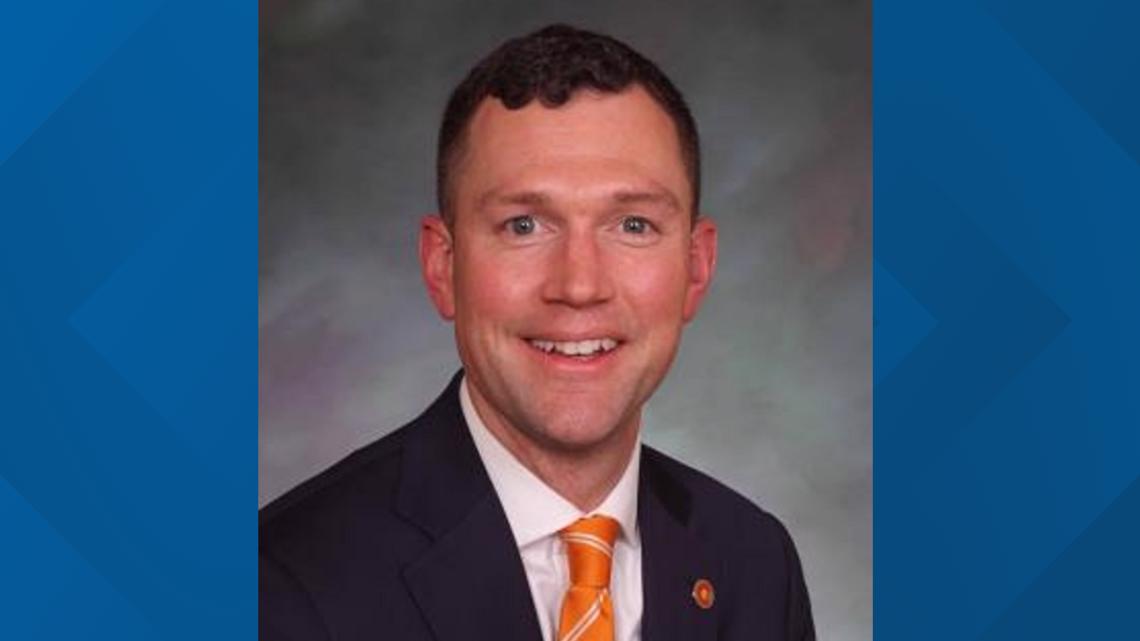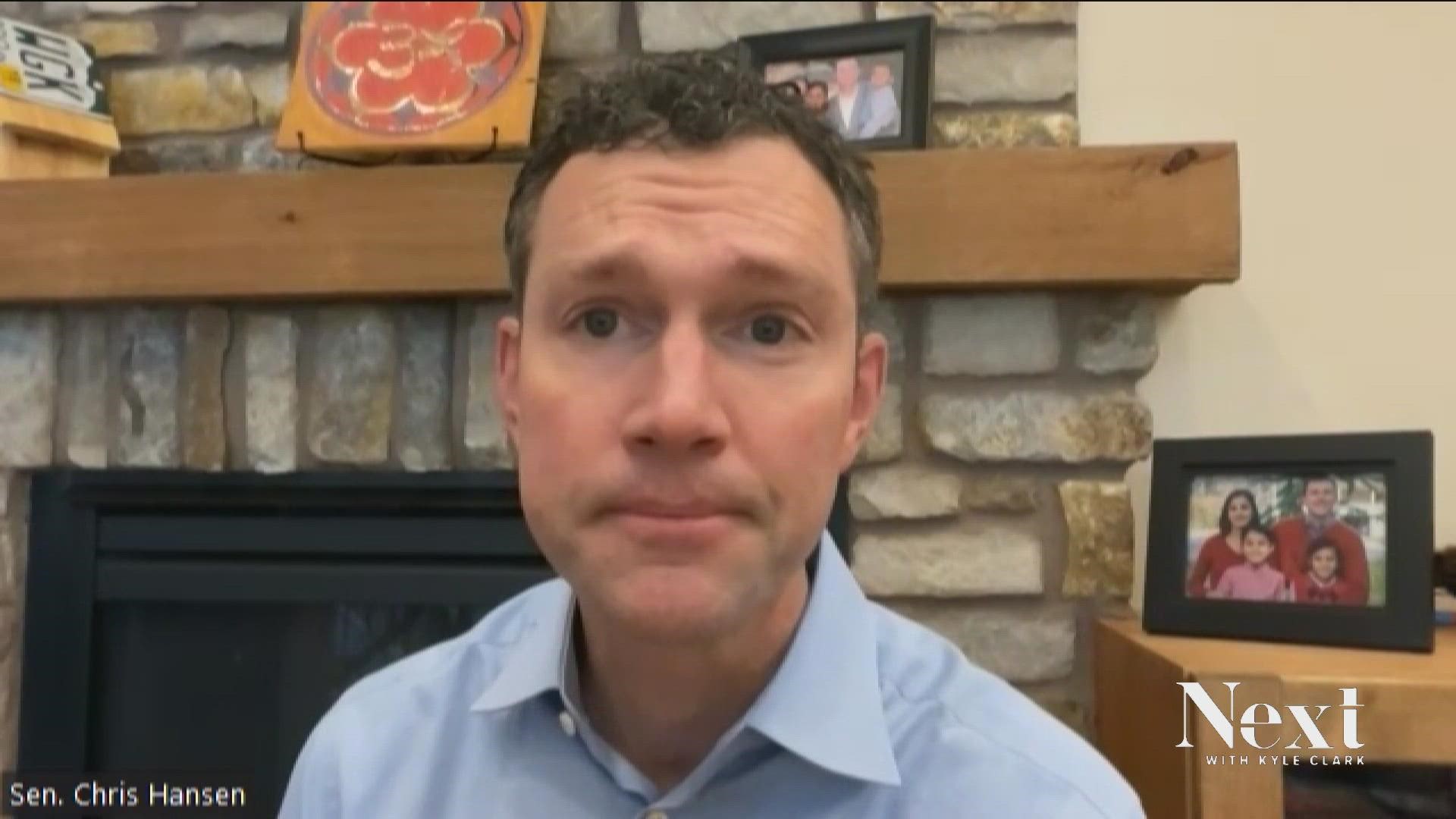DENVER — Democratic State Sen. Chris Hansen, who has had a hand in several notable bills in the state legislature, is running for Denver mayor.
Hansen filed the paperwork Monday morning, joining a growing list of names running for the office.
The city's municipal election is April 4.
“I'm, like many people, frustrated with what’s going on in the city right now and really feel like we are not living up to full potential, and so I really want to bring my private sector experience, my public sector experience, my passion for the city of Denver, and see if we can assemble a great team to tackle the challenges that we face right now," Hansen said in an interview with 9NEWS ahead of filing his paperwork.
Hansen has two years remaining in his term representing Senate District 31, which covers parts of Downtown Denver, Civic Center Park, Uptown, Congress Park, Washington Park, Cherry Creek and Lowry. He was a state representative when a vacancy committee appointed him to take over in the Senate after Democratic State Sen. Lois Court stepped down in 2020.
Hansen joins a field of women and diverse mayoral candidates including Democratic State Rep. Leslie Herod, Dr. Lisa Calderon, former Denver Metro Chamber CEO Kelly Brough, city councilwoman Debbie Ortega, notable community activist Terrance Roberts and environmental activist Ean Tafoya.
"Denver has had a really long history of carefully evaluating the candidates that are in the race, regardless of their background, their creed, their ethnicity, etc. And so I'm confident that Denver voters will be able to do that again," Hansen said. "And my approach is really just to put a lot of optimism, a lot of positive ideas in front of the Denver voters, and let them make the best decision. And I think there's a really great track record of Denver picking the best candidate. And I hope to earn everybody's vote."


This past year, Hansen served as vice chair of the powerful Joint Budget Committee (JBC) in the state legislature. The JBC meets year-round and crafts the state budget after each department makes its recommendations.
Ultimately, all 100 state lawmakers must approve the state budget, but the hard work is done by the six members of the JBC.
"I have studied the Denver budget extensively, and we have a budget that is largely dependent on sales taxes in the city and complemented with property taxes," Hansen said. "What I would like to really bring from my experience with the state budget is more evidence-based policymaking. I think the level of our spending is not way out of context or way out of proportion, but what I think we can do better is to do a sharper job of using evidence to guide our decisions."
He specifically said the city's current effort to help those experiencing homelessness is failing based on the money being spent.
"Arguably many of the programs we're doing for the unhoused, not showing great results right now. So that's a prime area, I think, to sharpen our focus and get more efficiency out of our spending," Hansen said.
He would not change the city's current method of clearing homeless encampments.
"We need clear enforcement of our camping ban, I think, for the city to be safe, for the city to function and be an inviting place for everybody who lives here. We need to be very clear that we're not going to be able to have camping on the streets. It's not good for anybody involved, for the neighborhoods or for those that are unhoused," Hansen said. "Denver really needs to make sure we're enforcing that, but at the same time providing great services and great pathways for people to break the cycle of homelessness."
He would reduce city spending and try to enhance partnerships with nonprofits to better serve those experiencing homelessness.
"This is where I think we can really step up our partnerships with nonprofits, particularly the Salvation Army [and] Denver Rescue Mission have had some great success. And I think that's a place where the city can really double down and work with the private sector and work with philanthropy to make more rapid progress," Hansen said.
When asked about an evidence-based example of what Denver is not doing to help those experiencing homelessness, he again mentioned work with nonprofits.
"I had a chance to spend the day with the Salvation Army a couple of months ago, and one of the things that I really took away from that was the incredible success they've had with providing services to families that are experiencing homelessness. They've reached about 90% placement rate for permanent housing, and so I really want to try to bring an entrepreneurial mindset to this where we double down on the things that are working really well, and we draw back or reduce the things that are not showing great promise," Hansen said.
He called enforcing the city's camping ban a high priority.
"The voters of Denver have been very clear about that, supporting it at over, you know, 80% during the last ballot question on this. And I think it's a key for Denver to be successful is that we try to get people out of that situation as quickly as possible. And I think clear enforcement is part of the approach," Hansen said.
In 2021, Denver Ballot Initiative 303 would have ended the city's camping ban if passed. It failed with 58% rejecting it, not 80%.
Based on his review of the city budget, he said there can be better efficiency in services for the unhoused and within public safety.
"We need to really focus those dollars on building a great police department. And we've enhanced that in this last budget that the mayor [Hancock] did. And that is going to be a really important part of making Denver successful," Hansen said.
He does not plan to reduce the budget for Denver Police.
"Not at all. I mean, I don't think the city can function without a world-class police department. We need a great police department. We need to celebrate great policing, and of course, hold mistakes accountable. And we've got some of those things we're seeing right now in the news. But I think that means reinvesting in a great police force, having a great pipeline of new recruits coming in. We're understaffed right now in the public safety departments. So police, sheriff, fire. And so I think it's time for reinvestment and efficiency, not a moment to cut," Hansen said.
The next mayor will get to choose their department heads and police chief, so does the next Denver Police Chief under a Hansen administration currently work for the Denver Police Department?
"Perhaps, I mean, I think that would be a little premature to start talking about that post. I was very excited to meet the new Denver Police Chief a couple of weeks ago. I think he's off to a strong start with his tenure, and myself, as a citizen of Denver, like everybody else, would be watching closely, you know, how things go for the new chief. But that'd be a decision that is, you know, will not be immediate. That is a decision that the next mayor gets to make and a big discussion during this campaign," Hansen said.
The city's mayoral race is nonpartisan, but Hansen is a Democrat. He considers himself pragmatic and progressive, but not the most progressive candidate in the field.
"I can safely say, I am not, depending on how you define that word. I think on the political spectrum, there are definitely some candidates already in the race who are well to my left, so to speak," Hansen said.
This election cycle is the first in which candidates for city office can access city funds to run for office. The Fair Elections Fund provides a nine times match for a contribution of $5 to $50, once a mayoral candidate receives 250 unique contributions.
Hansen joins the majority of mayoral candidates who will accept money from the Fair Elections Fund.
"Yes, absolutely. I am committed to using the Fair Election Fund, and plan to do that right out of the gate," Hansen said.
As a state senator, he could receive mayoral campaign contributions from people who could benefit from legislation he is working on at the state capitol.
"I don't think there's an inherent conflict. I'm going to do my very best to represent my district, in the state Senate. I think I can do that at a high level and still run for mayor. And so, I certainly will evaluate any potential conflicts. But, you know, I think these are two very different situations. And I think I can serve at a high level in the Senate while running," Hansen said.
In 2003, then-state Sen. Penfield Tate resigned to run for mayor. He told 9NEWS that it was not fair to his constituents based on the time required to run for mayor.
"That's something I've thought really carefully about. Over the summer and fall [I] have prepared my bills for introduction," Hansen said. "Very excited to continue to work on climate change, making sure our courts are functioning at a high level, providing tax relief to working families. Those are all policies that I have ready to go for this legislative session. And they're drafted and ready to go. I think [I] can still handle the outreach I need to do for the mayor's race."
SUGGESTED VIDEOS: Politics

